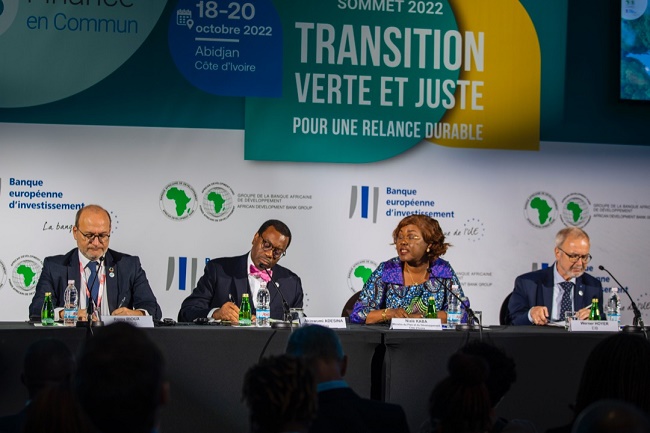Managers of Public Development Banks (PDBs) say there is the critical need to build the capacity of African countries to enable them tackle global emissions in a sustainable manner.

The managers said this at the “Finance in Common Summit” held in Abidjan, Côte d’Ivoire.
PDBs are financial institutions controlled or supported by central or local governments that aim to deliver on public policy objectives to support economic development in a country or region.
According to Agence Française de Développment, there are 450 PDBs around the world, on every continent.
Though varying widely in size and specialisation, they wield immense financial heft, with total assets standing at more than $11 trillion.
Despite their influence, people know little about the role they play or the impact they can have due to a lack of readily available data.
The leaders, however, spoke on the need to forge even stronger cooperation, adding that the summit would be proof of commitment to reducing poverty and “future proofing” the planet.
In his opening remarks, Prime Minister of Côte d’Ivoire, Patrick Achi, said he had “huge expectations” for Africa and his country.
Achi urged the coalition of PDBs to do more to support the private sector and for the development of renewable energy.
He also said the organisers of the summit should ensure that the meeting in Abidjan was “not just another summit, but rather one to meaningfully deliver firm commitments”.
Also speaking, the President of the African Development Bank (AfDB) Group, Dr Akinwumi Adesina, said Africa was beset by capital flight from emerging markets and increasing debt service costs.
Adesina also said fragile states depended on the African Development Fund (ADF), the concessional lending window of the AfDB.
“That is why together as Finance in Common, we need to do more to pool our resources and leverage the pools of capital in the private sector for climate finance.
“We must do all possible to ensure energy transitions, while recognising the specific needs of developing countries,” he said.
The bank introduced the Climate Action Window for the 16th replenishment of the ADF which would mobilise up to $13 billion over time for Africa’s low-income countries.
“We must leverage. We must tilt private financing to complement all our efforts,” he said.
Furthermore, President of the European Investment Bank, Werner Hoyer, said public development banks, which currently handle more than $23 trillion in assets between them, had a special role to play.
Hoyer said the role the banks had to play was in championing forward-looking assets to “future proof” the planet.
“We need to go the extra mile.”
He also called for “global solutions, schemes and initiatives that protect the most vulnerable.”
Also, Remy Rioux, the Chairman, Finance in Common and Chief Executive Officer, Agence Française de Développement, said public development banks were at the frontline of providing solutions and mobilising financing.
“I dream of a global and seamless architecture of all public financial institutions, clearly guided by the twin mandate of financing the most vulnerable and mobilising as many actors and financial actors for sustainable development,” Rioux said.
The President of the International Fund for Agricultural Development (IFAD), Alvaro Lario, said the current global conditions spelled a “clear call” for action.
“We cannot continue drifting from crisis to crisis. This has to start with small producers who are the heart of the world’s food systems,” he said.
He said the coalition’s support for investment in food and agriculture was of prime importance.
Moreover, Carlo Monticelli, Governor of the Council of Europe Development Bank, said PDBs needed to “join forces to multiply impact.”
Monticelli said this would be done while making the Sustainable Development Goals their common objective.
Also, Patrick Verkooijen, Chief Executive Officer of the Global Centre on Adaptation, spoke on the urgent need to continue mobilising financing for Africa’s adaptation efforts.
“The international community is at a crossroads. If all fails, all the gains of COP26 will be lost.”
Participants at the opening plenary also heard video messages from Deputy Secretary-General of the United Nations, Amina Mohammed.
Mohammed said there was the need for the coalition to multiply impact and work together to align their mandates to the Sustainable Development Goals (SDGs) and the Paris Agreement.
“PDBs need deeper, systemic reforms,” she said.
The Finance in Common coalition comprises over 520 public development banks across the world.
The summit has brought together their representatives as well as international and regional organisations, private sector corporates, philanthropies, civil society, and members of the academic community.
The AfDB and the European Investment Bank organised the summit under the theme “Green and Just Transition for a Sustainable Recovery”.
By Temitope Ponle
